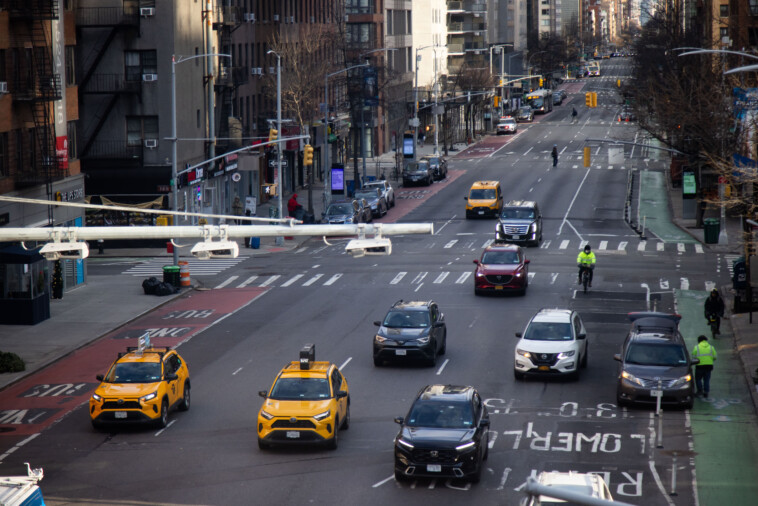Some Big Apple motorists were recently spotted with license plates subtly obscured using ultra low-tech methods — which could potentially be used to evade New York’s wildly unpopular congestion toll that just went into effect.
The Post spotted a variety of these sneaky, DIY tactics in action — often deployed on newer or high-end vehicles — reminiscent of the ongoing “ghost plates” problem which costs the city hundreds of millions each year.
While it’s not known whether the observed trickery is a direct result of the new $9 toll being imposed when entering Midtown Manhattan, many of the altered plates were sighted near the perimeters of the congestion zone on Sunday, when the fee went into effect.
The most basic method involved covering up or modifying a single digit on a license plate.
This was often done by scratching out a letter or number, like a car seen with an L painted over in white in an apparent attempt to blend it in with the background color of the current New York plates.
Another vehicle spotted near the toll zone had a letter E and a zero partially concealed with blobs of what appeared to be gray paint.
The subtlety of this method makes it difficult for cops to notice anything is amiss while at the same time rendering the plate unreadable to cameras.
The MTA’s gantry-mounted toll readers attempting to spy a license plate modified in such a way would likely misread it and be unable to charge the driver’s account.
A handful of similarly altered plates were seen by The Post around the area of Lexington Avenue and East 61st Street in Manhattan not far from the Ed Koch Queensboro Bridge, as well as near Canal Street.
Others were seen with a prominent bend or white streak of paint spanning the width of the plate and passing directly through all of the letters and numbers, which could alter its appearance just enough to flummox a toll camera without drawing the attention of law enforcement.
Some drivers — perhaps borrowing a trick from their days altering their grade on middle school test papers — changed one number to resemble another using paint or tape. One such plate had affixed a bolt over a number six in such a way to make it look like an eight.
The LED flashers are positioned directly on either side of the VAS plate, which could temporarily “blind” a license plate-reading camera as it attempts to read the digits to charge the toll.
The Post also saw a number of license plates coated with some kind of translucent goo that makes them harder to read, including by the human eye.
Plates coated in this manner will usually appear cloudy from behind, and produce a refraction effect when hit by a toll reader’s camera flash, which would make it more difficult to record the full plate number.
Bronx Councilman Oswald Feliz, who has pushed laws to crack down on ghost plates, said Monday that drivers using fraudulent and concealed license plates is a “widespread” problem around the city.
“If drivers obtain these ghost plates to run red lights and engage in speeding, just wait until they think about the congestion tolls they’ll need to pay to enter 60th Street,” he noted.
Get all the stories that move New York to your inbox
Sign up for our Metro Daily newsletter!
Thanks for signing up!
One well-known tool of the trade is attaching bogus dealer plates to the back of a car, which are easily removable when needed and can be acquired from an unscrupulous auto dealer or even printed out at home.
Would-be toll evaders also sometimes utilize high-tech methods featuring elaborate devices straight out of a James Bond movie, such as a “plate flipper” which enables the driver to rotate their license plates with the push of a button from inside the car.
At a press conference Monday, The Post asked Gov. Kathy Hochul to weigh in on how the Metropolitan Transportation Authority or state plans to determine the efficacy of the new toll scheme, which aims to raise billions to fund the transportation network’s $15 billion 2020-2024 capital improvement plan.
“There’ll be more data than you can imagine. Today is the first day, I wouldn’t count today’s data. Let’s give it a few days to sink in and get a trend,” Hochul told The Post.
“We’re going to be analyzing the data to see what the impacts are. I’m looking at everything: response times for emergency vehicles, I’m going to be looking at the length of drive time, I’ve got a lot of data I’ll be analyzing,” she assured.
Asked whether the data will be made available to the public, Hochul said, “of course,” saying it could be published as soon as Tuesday or later this week.
— Additional reporting by Aneeta Bhole







